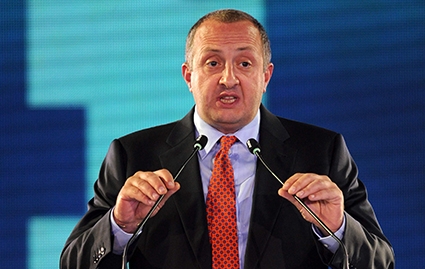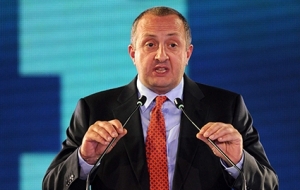Who will Represent the Georgian State at the UN General Assembly?
“Mr. President, Mr. Secretary General, Fellow Delegates, Ladies and Gentlemen. It is a great honor for me to represent my country here at the United Nations,” began Irakli Garibashvili, Georgia’s Prime Minister during his speech at the UN General Assembly last year.
The address followed several months of intense confrontation between the President and the Prime Minister of Georgia; both Giorgi Margvelashvili and Irakli Garibashvili insisted that the constitution grants him, and not the other, the right to represent the country at international summits.
In July 2014, the PM’s office announced that Garibashvili would attend the annual UN General Debate in September and would also take part in number of events which were organized on the sideline of the UN General Assembly.
On the same day President’s office announced that Margvelashvili had accepted an invitation from Ban Ki-Moon, the UN Secretary-General, who had invited the President, together with other world leaders, to the UN headquarters for the Climate Summit on September 23, which was to be held on the eve of opening of the UN General Debate.
The Ministry of Foreign Affairs (MFA), led by then-Foreign Minister Maia Panjikidze, tried to encourage the President to revise his decision and not to participate in the UN Climate Summit as PM Garibashvili, who was expected to address the UN General Assembly, would also be attending the same event. The Ministry claimed that it would be inappropriate and “embarrassing” for the country to send “two leaders” to the same event in New York.
As before the event President Margvelashvili announced that his visit to the United States was deliberately disrupted by the PM and his office, it was obvious that eventually Garibashvili would lead the Georgian delegation and address the UN Summit.
Georgia’s representation in this year’s UN annual session, one of the most representative and high-level international events of 2015, is still controversial between the two respective camps. Giorgi Margvelashvili, Head of State, or Prime Minister, Head of the Government – this remains an issue of political speculation again as the date approaches.
The PM’s office has already published Garibashvili’s schedule for 15 September, in which he clearly plans to lead the delegation to the UN. He is also expected to deliver a speech on behalf of the Georgian state. However, it appears that President Margvelashvili will also pay a visit to New York in the same period, as he has been invited by the Latvian President to attend the discussion “Future of Europe: Empowering the Role of Women.”
Maia Panjikidze, the former Foreign Minister of Georgia, currently one of the leaders of the Free Democrats Party, now says:
“We had a very bad practice of public discussions about who would go to the United Nations. I had hoped we would learn something from last year’s experience... I cannot imagine the PM to be the head of a delegation and the President to be a member of the same delegation or vice versa. I don’t think this has ever happened in the history of the UN.”
In response to the former Foreign Minister, the President’s Advisor for Foreign Affairs Tengiz Pkhaladze said: “remarks from a person who was personally engaged in last year’s mistake are unacceptable.”
At the press conference which the President’s administration held on Wednesday, August 19, Pkhaladze further explained: “Since the President will be in the US when the UN General Debates take place, it would be good if he was given an opportunity to address the UN General Assembly.” According to Margvelashvili’s Advisor, “Georgia’s President is the highest political figure, directly elected by the Georgian people; therefore, it is important for the country to maximally use his authority in the international arena.”
Davit Kereselidze, Spokesman of the Foreign Ministry, said any decision made at the highest level will be fulfilled by the MFA. However, it seems likely it will again be Irakli Garibashvili, Bidzina Ivanishvili’s trusted man, who will end up delivering the speech in New York.
The power struggle between the President and the Prime Minister of Georgia has not been limited to the representation at UN annual sessions. Similar disputes occurred when it came to signing the Association Agreement with the European Union.
As President Margvelashvili drifts away from the Georgian Dream, the current ruling party led by Prime Minister Garibashvili, most likely, the confrontation between the two will continue over the coming months. One could claim this constant competition contributes to democratic developments in the country; but, what is more obvious, it seriously impedes Georgia’s performance on the international stage, as the dispute between the two leaders negatively reflects on the ability of the country to speak with one voice in its foreign relations.
Nino Japarashvili












